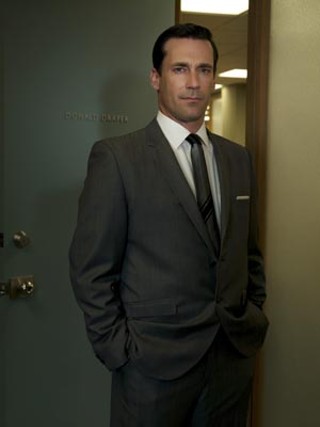TV Eye
Truth in Advertising
By Belinda Acosta, Fri., Aug. 1, 2008

Finally, a reason to watch TV again: Mad Men (AMC) is back! After a summer of loathsome reality series, reruns, and nonstop infotainment, how refreshing it is to see this hour of TV magic back on the air after a long, long year.
A lot has been written about how well Mad Men captures the early Sixties. Indeed, it is gorgeous to watch, and the trip back in time to when racism, sexism, and almost every other "ism" you can think of was so overt is sobering. But I think the larger question in my mind when I watch Mad Men is: What is it about the period piece that resonates in the present?
Part of the answer might lie in the approach. And in this, not all period pieces are alike. Take a look at the almost unwatchable Swingtown (CBS). Set in the 1970s, this series about suburban swingers (married couples who swap partners) is so self-conscious of its milieu that its dramatic moments feel contrived. Not so with Mad Men, which is all the more spectacular since both series are anchored around desire.
Mad Men's Don Draper (Jon Hamm) is the show's central character, a handsome, Madison Avenue ad exec married to a beautiful woman. He has a lovely house in the suburbs and a picture-perfect life. As the series has progressed, we see that he wants a deeper experience, an experience that eludes him – aesthetic, intellectual, perhaps even spiritual. He wants to experience that thing that is larger than himself. It's the reason he's a successful ad man –he knows that striking those notes under the surface is what will ultimately sell the product. But he has neglected to strike the same notes in his own life – a life that's based on a lie. (Watch season one, which just came out on DVD, to discover his secret.)
Mad Men is one of those series that requires your attention. You can't watch it while doing something else (you wouldn't want to, anyway). Many scenes are understated yet so layered with meaning that they ache with melancholy. But it's not all longing and pensiveness. There are moments of humor, as in the scene when office manager Joan Holloway (Christina Hendricks) is debating where to put the brand-new, mammoth-size copier, explaining that she does not want to keep it in the hallway because she doesn't want the office to look as if it's bursting at the seams – all the while she's wearing another one of her painted-on dresses.
But why do Mad Men's era-specific stories and themes play so powerfully in the present? Maybe it has something to do with the show's exploration of excess. If pre-1965 was all about keeping up appearances, the present is about making appearances. Don Draper may have taken a shortcut to reinvent himself covertly, but there isn't that much difference between him and a reality-show contestant, particularly in those shows where the goal is for one winner to rise above the rest to be the best chef, the top model, the next star, the lone survivor. There is always that moment in these reality series where a "confession" occurs. This is where the contestant offers a "candid" expression of his need to prove something to himself or his family or the desire to reignite his life after some failure, false start, or bad luck.
It's the rah-rah moment that is supposed to rope us in to root for the contestant. Reinvention is the American way, after all. If you allow yourself to get wrapped up in some of these competitions, particularly of the winner-take-all variety (American Idol is a good example), you get to see the "transformation," and then what? When it's all said and done, the experience was only a vicarious experience for the viewer, not a real one.
When I watch Mad Men, I know I'm not Don Draper or the rest, but something in their stories feels familiar and full and gratifying. You walk around with the episode for a day or more, replaying scenes with friends who also watch the series, sharing their equally vague ideas of what draws them to the series, because it's much more than the handsome characters, the lush sets, the fine attention to detail in set decoration, language, and costumes. When it comes right down to it, the search for deeper meaning never goes out of style. And through Mad Men, you take the journey with some of the most intriguing characters to appear on TV.
Mad Men airs Sundays at 9pm on AMC.










